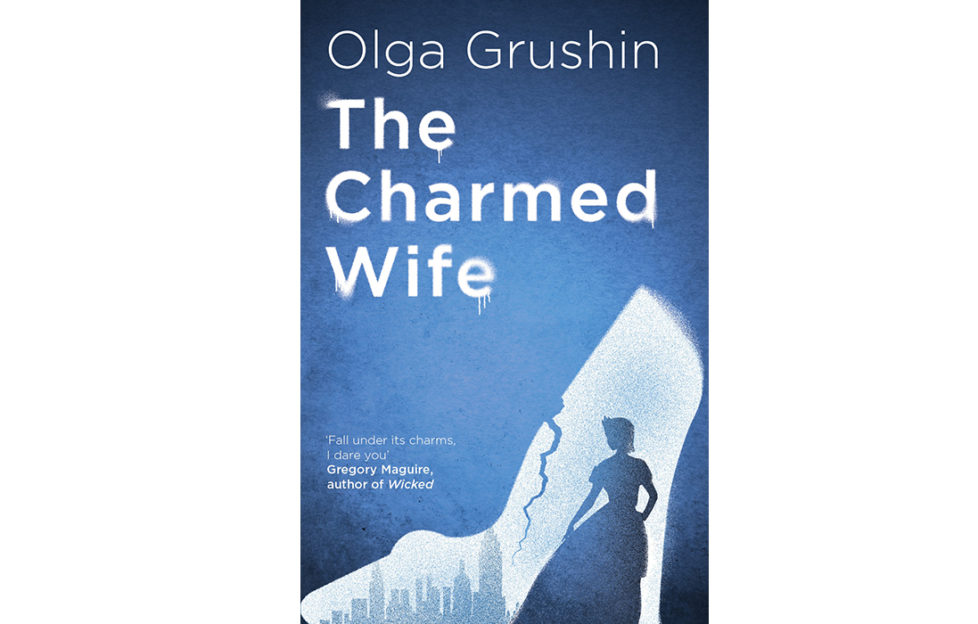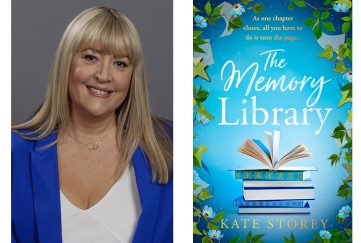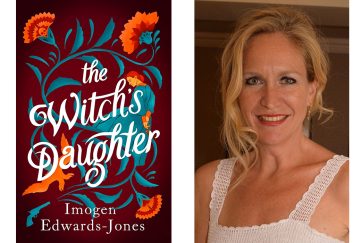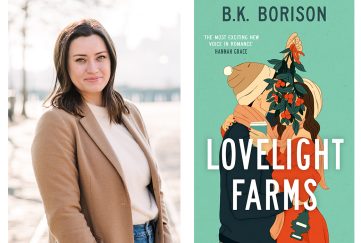Olga Grushin on The Charmed Wife

Olga Grushin’s fourth novel is not what it seems, at times dark then whimsical, happy and sad, an intriguing mix of fantasy and reality. We talk to Olga about her work and her new book, The Charmed Wife
The Charmed Wife
Cinderella married the man of her dreams – the perfect ending she deserved after dutifully following all of the fairy-tale rules. Yet now, two children and thirteen-and-a-half years later, things have gone badly wrong and her life is far from perfect.
One night, she sneaks out of the palace to get help from the Witch who, for a price, offers love potions to unhappy housewives. But as the old hag flings the final ingredients into the cauldron, Cinderella doesn’t ask for a love spell to win back her Prince Charming. Instead, she wants him dead.
Through stunning, evocative writing, Olga Grushin’s fourth novel will take you deep into the heart of romance, marriage, and the very nature of storytelling.
An extract from Olga
The Charmed Wife by Olga Grushin was published by Hodder & Stoughton in hardback, audio and eBook on January 21, £17.99
Q & A
When did you first start writing fiction?
I grew up in Russia, in a family of journalists and editors, and I knew I wanted to be a writer when I was four. My earliest creation, in fact, dates from around that age. Scrawled in backward letters, it opens on a rather dramatic note: “’Ring-ring!’ The princess answered the door. Several princes stood on the porch, all in a row handsome.” The first chapter book, which I wrote at seven, was yet another “happily ever after” story, titled “The Tale of a Lazy Princess and a Brave Prince.” They say the writer’s first novel tends to be autobiographical in nature, and it was certainly true in my case: the princess was always grumbling about making her bed and fixing breakfast for her father the king.
I have not stopped writing since, but the characters of my adult works changed from royalty to underground artists, old ballet dancers, Soviet bureaucrats, frustrated poets, and wayward gods. Funnily enough, though, I did return to my very first theme of romance-obsessed princesses in my most recent book, The Charmed Wife, out this month.
Tell me a bit about your journey to getting your first novel published?
I published my first novel, The Dream Life of Sukhanov, when I was thirty-four, so it took me exactly three decades to traverse the distance between those first scribbles and my name on a book jacket. My particular road sent me on a long and unexpected detour because I had to abandon my native tongue along the way: when I was eighteen, I moved to the United States, and then needed to learn how to write virtually from scratch, in a language not my own. For some years after college, I lived your typical impoverished-artist life, renting a basement studio, typing manuscripts on a cheap electric typewriter and mailing them out to obscure publications. The first place that accepted a short story from me was a little magazine called, of all things, Happy. They paid me five dollars, as I recall – easily the best money I have ever earned in my life. I had no writing community, I never took any classes, I knew no people in the industry; I just bought some “How to Break into Print” guides, and, once I finished my novel, pored over lists of agents and sent out blind queries to those who represented fiction that took narrative risks. And, to be honest, I still find myself surprised at the result.
What inspired the idea for your first novel?
My first novel was The Dream Life of Sukhanov, published in 2006. Set in Moscow in 1985, it is a study of betrayal and its consequences, and concerns a middle-aged man who had once been a brilliant painter but traded the dangers of his nonconformist existence for the perks of a Soviet apparatchik. Like all of my novels, it was not autobiographical, but it did draw on the atmosphere of my childhood, the stories I heard from my parents and their friends. I actually had the first glimmering of the idea while still a teenager in Russia, during the heady years of perestroika, and I found myself wanting to explore it even more after a decade of struggling to be an artist in America.
Tell me a bit about what you hope readers will love about The Charmed Wife.
My most recent, fourth, novel is a true departure for me – a riff on Cinderella, it is a mix of fantasy and reality that falls between genres and breaks many narrative rules. When I worked on it, I thought of it as an exploration of contemporary women’s issues – romantic expectations, marriage, motherhood, identity, age – as viewed through the lens of fairy-tale metaphors, of the stories we tell ourselves and our children. It is not at all a formulaic retelling, and as far from pastel-colored Disney yarns as it is possible to get. The story moves through dreamy landscapes where nothing is as it seems, between times, places, and paradigms; it has talking mice and absent-minded magicians, yes, but it also has divorce lawyers and custody battles. And there is certainly darkness in the book, and there is sadness, too, but there are whimsy and laughter there as well – and I myself had such fun writing it! I hope, then, that readers approach it with an open mind and enjoy having their expectations turned upside down. Because, most likely, this is not quite the book they think it is.
Tell me about authors who inspire you.
The list is large and changes all the time, but a few names have been fixtures for a long time now. Nabokov, for the magic of his language, in Russian and in English both – and for the hope he gives me about the possibilities of bridging the gulf between the two. Gogol and Bulgakov for the fantastical they see in the mundane. Borges and Calvino for the dizzy inventiveness of their mind-bending puzzles. Flaubert and Proust for their nuanced understanding of psychology. Lewis Carroll and Laurence Sterne for their whimsy. And Chekhov and Bohumil Hrabal for their humanity.
What tips would you give to aspiring novelists?
I agree with much of the commonly given advice – read as much as you can, budget your time, approach writing as work rather than flights of inspiration, and the like. The one bit of advice I ardently disagree with is the tired old “Write what you know.” Write what you don’t know instead. Step out of your comfort zone, stretch the muscles of your imagination, imagine being someone else, someplace else, sometime else entirely. For the joy of writing, much as the joy of reading, is in being transported.
Where do you find your writing inspiration?
Like so many writers, I’d have to answer: everywhere. Books I read, art I see, conversations I overhear, family history and history with a capital H, even, on occasion, dreams. We live surrounded by stories, really, a never-ending swell of them – so I suppose I just look around and pick out the ones that insist on being told louder than the rest.
What’s next? Are you working on another book?
I keep a mental list of subjects I’d love to explore, and the list is so long that I am always working on something. But sometimes I’ll start one project, then set it aside for a while and turn to something else. I was actually in the planning stages of a magical book set in Prague (I spent five years there as a child, and it is my favorite place on earth) when I was overtaken by another, more immediate, notion, and I’ll be writing that first. I’m afraid it is rather dark and dystopian – just what we need right now, in the midst of all the present madness – but I have to feel a certain sense of urgency when I write, and this story feels urgent to me.




